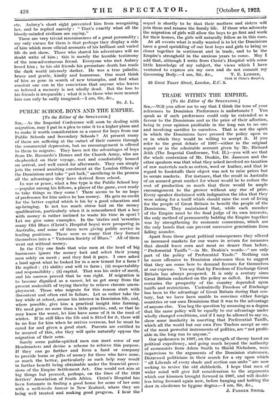TRADE WITHIN THE EMPIRE,
[To the Editor of the SPECTATOR.] SIR,—Will you allow me to say that I think the tone of your
references to Dominion Preferences is unfortunate ? You speak as if such preferences could only be extended as a favour to the Dominions and as the price of their affection, being in your opinion profitable in the long run to no one and involving sacrifice to ourselves. That is not the spirit in which the Dominions have pressed the policy upon us or in which they would be willing to accept it. If you refer to the great debate of 1907—either in the original report or in the admirable account given by Mr. Richard Jebb (The Imperial Conference, Vol. II.)—you will see that the whole contention of Mr. Deakin, Dr. Jameson and the other speakers was that what they asked involved no taxation of raw materials such as cotton, wool or leather, and that in regard to foodstuffs their object was not to raise prices but to secure markets. For instance, that the result in Australia of an assured great market for wheat would be to reduce the cost of production so much that there would be ample encouragement to the grower without any rise of price. Every speaker disclaimed with indignation the idea that they were asking for a tariff which should raise the cost of living for the people of Great Britain to benefit the people of the Dominions. They maintained that, while each member of the Empire must be the final judge of its own interests, the only method of permanently holding the Empire together wis by strengthening its economic connexions, which are the only bonds that can prevent successive generations from falling asunder.
Apart from these great political consequences they offered us increased markets for our wares in return for measures that should leave corn and meat no dearer than before. " Preferential Tariffs "—in Mr. Deakin's words—" arc only part of the policy of Preferential Trade." Nothing can be more offensive to Dominion statesmen than to suggest that they are come here to demand favours for themselves at our expense. You say that by Freedom of Exchange Great Britain has always prospered. It is only a century since Great Britain embarked on the policy so called. In previous centuries the prosperity of the country depended upon tariffs and restrictions. Undoubtedly Freedom of Exchange has been to the advantage of Great Britain during that cen- tury, but we have been unable to convince either foreign countries or our own Dominions that it was to the advantage of anyone else. You beg the question by assuming as a dogma that the same policy will be equally to our advantage under wholly changed conditions, and if I may be allowed to say so, show some insularity in asserting that Preferential Tariffs, which all the world but our own Free Traders accept as one of the most powerful instruments of politics, are " not profit- able in. the long run to anyone."
Our spokesmen in 1907, on the strength of theory based on political expediency, and going much beyond the authority of economists from Adam Smith to Shield Nicholson, were impervious to the arguments of the Dominion statesmen. Distressed politicians in their search for a cry upon which " all Liberals of every shade and section can unite" are now seeking to revive the old shibboleth. I hope that men of wider mind will give full consideration to the arguments which our kinsmen brought forward in 1907, and will doubt- less bring forward again now, before banging and bolting the door in obedience to bygone dogma.—I am, Sir, &c.,
J. PARKER SMITH.










































 Previous page
Previous page